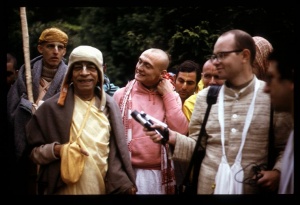CC Antya 5.131 (1975)

A.C. Bhaktivedanta Swami Prabhupada
Below is the 1996 edition text, ready to be substituted with the 1975 one using the compile form.
TEXT 131
- “yāha, bhāgavata paḍa vaiṣṇavera sthāne
- ekānta āśraya kara caitanya-caraṇe
SYNONYMS
yāha—just go; bhāgavata paḍa—read Śrīmad-Bhāgavatam; vaiṣṇavera sthāne—from a self-realized Vaiṣṇava; ekānta āśraya kara—fully surrender; caitanya-caraṇe—at the lotus feet of Śrī Caitanya Mahāprabhu.
TRANSLATION
“If you want to understand Śrīmad-Bhāgavatam,” he said, “you must approach a self-realized Vaiṣṇava and hear from him. You can do this when you have completely taken shelter of the lotus feet of Śrī Caitanya Mahāprabhu.”
PURPORT
Herein Svarūpa Dāmodara Gosvāmī instructs the poet from Bengal to hear Śrīmad-Bhāgavatam from a pure Vaiṣṇava and learn from him. In India especially, there is now a class of professional Bhāgavatam readers whose means of livelihood is to go from village to village, town to town, reading Bhāgavatam and collecting dakṣiṇā, or rewards, in the form of money or goods, like umbrellas, cloth and fruit. Thus there is now a system of Bhāgavata business, with recitations called bhāgavata-saptāha that continue for one week, although this is not mentioned in Śrīmad-Bhāgavatam. Nowhere does Śrīmad-Bhāgavatam say that the Bhāgavatam should be heard for one week from professionals. Rather, Śrīmad-Bhāgavatam (SB 1.2.17) says, śṛṇvatāṁ sva-kathāḥ kṛṣṇaḥ puṇya-śravaṇa-kīrtanaḥ: one should regularly hear Śrīmad-Bhāgavatam from a self-realized Vaiṣṇava. By such hearing, one becomes pious: hṛdy antaḥ-stho hy abhadrāṇi vidhunoti suhṛt satām. As one thus hears the Bhāgavatam regularly and sincerely, his heart is purified of all material contamination:
- naṣṭa-prāyeṣv abhadreṣu nityaṁ bhāgavata-sevayā
- bhagavaty uttama-śloke bhaktir bhavati naiṣṭhikī
“By regularly hearing the Bhāgavatam and by rendering of service to the pure devotee, all that is troublesome to the heart is almost completely destroyed, and loving service unto the Personality of Godhead, who is praised with transcendental songs, is established as an irrevocable fact.” (SB 1.2.18)
This is the proper process, but people are accustomed to being misled by professional Bhāgavatam reciters. Therefore Svarūpa Dāmodara Gosvāmī herein advises that one should not hear Śrīmad-Bhāgavatam from professional reciters. Instead, one must hear and learn the Bhāgavatam from a self-realized Vaiṣṇava. Sometimes it is seen that when a Māyāvādī sannyāsī reads the Bhāgavatam, flocks of men go to hear jugglery of words that cannot awaken their dormant love for Kṛṣṇa. Sometimes people go to see professional dramas and offer food and money to the players, who are expert at collecting these offerings very nicely. The result is that the members of the audience remain in the same position of gṛham andha-kūpam, family affection, and do not awaken their love for Kṛṣṇa.
In the Bhāgavatam (7.5.30), it is said, matir na kṛṣṇe parataḥ svato vā mitho ‘bhipadyeta gṛha-vratānām: the gṛha-vratas, those who are determined to continue following the materialistic way of life, will never awaken their dormant love of Kṛṣṇa, for they hear the Bhāgavatam only to solidify their position in household life and to be happy in family affairs and sex. Condemning this process of hearing the Bhāgavatam from professionals, Svarūpa Dāmodara Gosvāmī says, yāha, bhāgavata paḍa vaiṣṇavera sthāne: “To understand the Śrīmad-Bhāgavatam, you must approach a self-realized Vaiṣṇava.” One should rigidly avoid hearing the Bhāgavatam from a Māyāvādī or other nondevotee who simply performs a grammatical jugglery of words to twist some meaning from the text, collect money from the innocent public, and thus keep people in darkness.
Svarūpa Dāmodara Gosvāmī strictly prohibits the behavior of the materialistic so-called hearers of Śrīmad-Bhāgavatam. Instead of awakening real love for Kṛṣṇa, such hearers of the Bhāgavatam become more and more attached to household affairs and sex life (yan maithunādi-gṛhamedhi-sukhaṁ hi tuccham (SB 7.9.45)). One should hear Śrīmad-Bhāgavatam from a person who has no connection with material activities, or, in other words, from a paramahaṁsa Vaiṣṇava, one who has achieved the highest stage of sannyāsa. This, of course, is not possible unless one takes shelter of the lotus feet of Śrī Caitanya Mahāprabhu. Śrīmad-Bhāgavatam is understandable only for one who can follow in the footsteps of Śrī Caitanya Mahāprabhu.